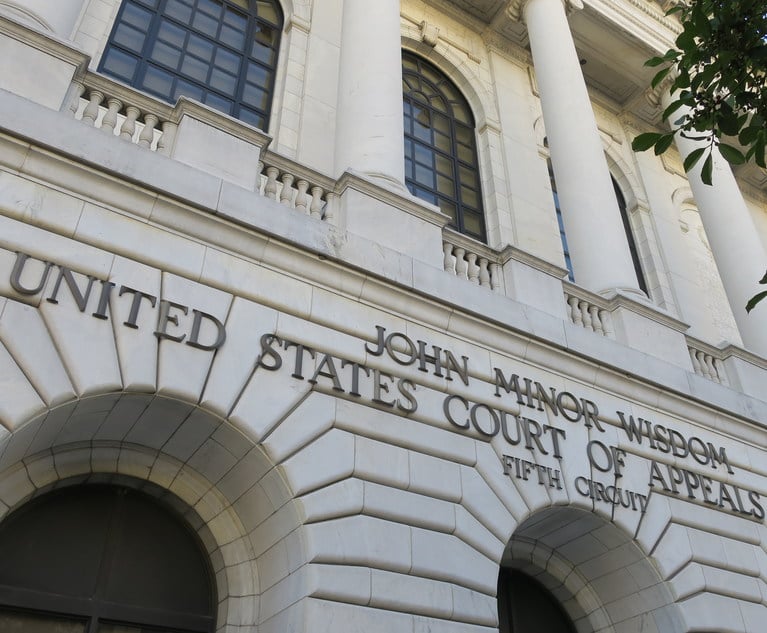Biometric Hand Scanner Violated Coal Miner's 'Mark of the Beast' Belief: Court
An appeals court ruled Monday that a West Virginia coal mining company interfered with a worker's religious beliefs after the evangelical Christian likened the company's biometric hand scanners to clock in and out to the "Mark of the Beast," as described in the Book of Revelation.
June 12, 2017 at 05:58 PM
8 minute read
An appeals court ruled Monday that a West Virginia coal mining company interfered with a worker's religious beliefs after the evangelical Christian likened the company's biometric hand scanners to clock in and out to the “Mark of the Beast,” as described in the Book of Revelation.
A panel on the U.S. Court of Appeals for the Fourth Circuit found Pennsylvania-based Consol Energy Inc. erred in refusing to accommodate 37-year employee Beverly Butcher's religious beliefs. The appeals court denied the company a new trial and upheld the roughly $440,000 in lost wage and benefit damages.
The U.S. Equal Employment Opportunity Commission sued Consol on behalf of the the coal miner, who retired under protest in 2012 when the company refused to accommodate his beliefs to not use the hand scanner. Consol installed the biometric scanner at a mine, in West Virginia, to monitor employee attendance and work hours. The company required each employee checking in and out of a shift to scan his or her right hand, connecting to a personnel number.
Butcher testified that his understanding of the Book of Revelation found that a mark brands followers of the Antichrist. He believed using the scanning system, which did not make a physical mark, could lead to identification by the Antichrist. In a separate and unrelated incident, he petitioned for his grandchildren to be exempted from using a finger scanning device at their school, citing the same beliefs, according to the Fourth Circuit. The appeals court said the sincerity of Butcher's beliefs was not disputed.
In a letter to the company Butcher wrote, “As a Christian I believe it would not be in the best interest of a Christian believer to participate in the use of a hand scanner. Even though this hand scanner is not giving a number or mark, it is a device leading up to that time when it will come to fruition, and in good faith and a strong belief in my religion, I would not want to participate in this program.”
According to court documents, his supervisors had a different interpretation of scripture and said the use of the left hand would be sufficient. The company made accommodations for workers with physical injuries but not Butcher, arguing in a memo, “Let's make our religious objector use his left hand.”
The appeals court upheld Butcher's $436,860.74 award in front and back pay and lost benefits, and the permanent injunction against Consol, requiring the company—headquartered near Pittsburgh—to refrain from future violations of Title VII's reasonable accommodation provision and to provide management training on religious accommodations.
The core of Consol's defense was that it did not fail to reasonably accommodate Butcher's religious beliefs because he essentially was misinterpreting the scripture passage about a mark showing allegiance with the Antichrist.
In its brief to the court, the company, represented by Wheeling, West Virginia's Grove, Holmstrand & Delk, argued that the Book of Revelation specifically references the right hand and use of the left hand should not conflict.
“But all of this, of course, is beside the point,” the Fourth Circuit wrote in its ruling. “It is not Consol's place as an employer, nor ours as a court, to question the correctness or even the plausibility of Butcher's religious understandings. So long as there is sufficient evidence that Butcher's beliefs are sincerely held—which the jury specifically found, and Consol does not dispute—and conflict with Consol's employment requirement, that is the end of the matter.”
Punitive damages, requested by the EEOC, were not granted in either court ruling. Such damages would require that the company acted in reckless indifference to Butcher's religious accommodation rights. The court found that the EEOC's evidence was insufficient to show that kind of behavior.
Related Articles:
|- An Employee Spoke Out on Glassdoor.com, and Now the EEOC Is Suing His Company
- EEOC Fights Ninth Circuit Ruling That 'Institutionalizes' Gender Pay Gap
- Court Confronts Scope of EEOC's Power to Dig Into Company Files
An appeals court ruled Monday that a West
A panel on the U.S. Court of Appeals for the Fourth Circuit found Pennsylvania-based
The U.S.
Butcher testified that his understanding of the Book of Revelation found that a mark brands followers of the Antichrist. He believed using the scanning system, which did not make a physical mark, could lead to identification by the Antichrist. In a separate and unrelated incident, he petitioned for his grandchildren to be exempted from using a finger scanning device at their school, citing the same beliefs, according to the Fourth Circuit. The appeals court said the sincerity of Butcher's beliefs was not disputed.
In a letter to the company Butcher wrote, “As a Christian I believe it would not be in the best interest of a Christian believer to participate in the use of a hand scanner. Even though this hand scanner is not giving a number or mark, it is a device leading up to that time when it will come to fruition, and in good faith and a strong belief in my religion, I would not want to participate in this program.”
According to court documents, his supervisors had a different interpretation of scripture and said the use of the left hand would be sufficient. The company made accommodations for workers with physical injuries but not Butcher, arguing in a memo, “Let's make our religious objector use his left hand.”
The appeals court upheld Butcher's $436,860.74 award in front and back pay and lost benefits, and the permanent injunction against Consol, requiring the company—headquartered near Pittsburgh—to refrain from future violations of Title VII's reasonable accommodation provision and to provide management training on religious accommodations.
The core of Consol's defense was that it did not fail to reasonably accommodate Butcher's religious beliefs because he essentially was misinterpreting the scripture passage about a mark showing allegiance with the Antichrist.
In its brief to the court, the company, represented by Wheeling, West
“But all of this, of course, is beside the point,” the Fourth Circuit wrote in its ruling. “It is not Consol's place as an employer, nor ours as a court, to question the correctness or even the plausibility of Butcher's religious understandings. So long as there is sufficient evidence that Butcher's beliefs are sincerely held—which the jury specifically found, and Consol does not dispute—and conflict with Consol's employment requirement, that is the end of the matter.”
Punitive damages, requested by the EEOC, were not granted in either court ruling. Such damages would require that the company acted in reckless indifference to Butcher's religious accommodation rights. The court found that the EEOC's evidence was insufficient to show that kind of behavior.
This content has been archived. It is available through our partners, LexisNexis® and Bloomberg Law.
To view this content, please continue to their sites.
Not a Lexis Subscriber?
Subscribe Now
Not a Bloomberg Law Subscriber?
Subscribe Now
NOT FOR REPRINT
© 2025 ALM Global, LLC, All Rights Reserved. Request academic re-use from www.copyright.com. All other uses, submit a request to [email protected]. For more information visit Asset & Logo Licensing.
You Might Like
View All
Legal Issues to Watch in the US Appeals Courts in 2025

Second Circuit Upholds $5M Judgment Against Trump in E. Jean Carroll Case
4 minute read
Divided 5th Circuit Shoots Down Nasdaq Diversity Rules

Nevada Supreme Court to Decide Fate of Groundbreaking Contingency Cap Ballot Measure
5 minute readTrending Stories
- 1The Appropriate Exemption in Students for Fair Admissions v. President & Fellows of Harvard College
- 2DOJ, 10 State AGs File Amended Antitrust Complaint Against RealPage and Big Landlords
- 3New Partners at Cummings & Lockwood, Carmody Torrance Sandak & Hennessey
- 4'Extra Government'?: NY Top Court Eyes Ethics Commission's Constitutionality
- 5South Texas College of Law Houston Selects New Dean
Who Got The Work
Michael G. Bongiorno, Andrew Scott Dulberg and Elizabeth E. Driscoll from Wilmer Cutler Pickering Hale and Dorr have stepped in to represent Symbotic Inc., an A.I.-enabled technology platform that focuses on increasing supply chain efficiency, and other defendants in a pending shareholder derivative lawsuit. The case, filed Oct. 2 in Massachusetts District Court by the Brown Law Firm on behalf of Stephen Austen, accuses certain officers and directors of misleading investors in regard to Symbotic's potential for margin growth by failing to disclose that the company was not equipped to timely deploy its systems or manage expenses through project delays. The case, assigned to U.S. District Judge Nathaniel M. Gorton, is 1:24-cv-12522, Austen v. Cohen et al.
Who Got The Work
Edmund Polubinski and Marie Killmond of Davis Polk & Wardwell have entered appearances for data platform software development company MongoDB and other defendants in a pending shareholder derivative lawsuit. The action, filed Oct. 7 in New York Southern District Court by the Brown Law Firm, accuses the company's directors and/or officers of falsely expressing confidence in the company’s restructuring of its sales incentive plan and downplaying the severity of decreases in its upfront commitments. The case is 1:24-cv-07594, Roy v. Ittycheria et al.
Who Got The Work
Amy O. Bruchs and Kurt F. Ellison of Michael Best & Friedrich have entered appearances for Epic Systems Corp. in a pending employment discrimination lawsuit. The suit was filed Sept. 7 in Wisconsin Western District Court by Levine Eisberner LLC and Siri & Glimstad on behalf of a project manager who claims that he was wrongfully terminated after applying for a religious exemption to the defendant's COVID-19 vaccine mandate. The case, assigned to U.S. Magistrate Judge Anita Marie Boor, is 3:24-cv-00630, Secker, Nathan v. Epic Systems Corporation.
Who Got The Work
David X. Sullivan, Thomas J. Finn and Gregory A. Hall from McCarter & English have entered appearances for Sunrun Installation Services in a pending civil rights lawsuit. The complaint was filed Sept. 4 in Connecticut District Court by attorney Robert M. Berke on behalf of former employee George Edward Steins, who was arrested and charged with employing an unregistered home improvement salesperson. The complaint alleges that had Sunrun informed the Connecticut Department of Consumer Protection that the plaintiff's employment had ended in 2017 and that he no longer held Sunrun's home improvement contractor license, he would not have been hit with charges, which were dismissed in May 2024. The case, assigned to U.S. District Judge Jeffrey A. Meyer, is 3:24-cv-01423, Steins v. Sunrun, Inc. et al.
Who Got The Work
Greenberg Traurig shareholder Joshua L. Raskin has entered an appearance for boohoo.com UK Ltd. in a pending patent infringement lawsuit. The suit, filed Sept. 3 in Texas Eastern District Court by Rozier Hardt McDonough on behalf of Alto Dynamics, asserts five patents related to an online shopping platform. The case, assigned to U.S. District Judge Rodney Gilstrap, is 2:24-cv-00719, Alto Dynamics, LLC v. boohoo.com UK Limited.
Featured Firms
Law Offices of Gary Martin Hays & Associates, P.C.
(470) 294-1674
Law Offices of Mark E. Salomone
(857) 444-6468
Smith & Hassler
(713) 739-1250










